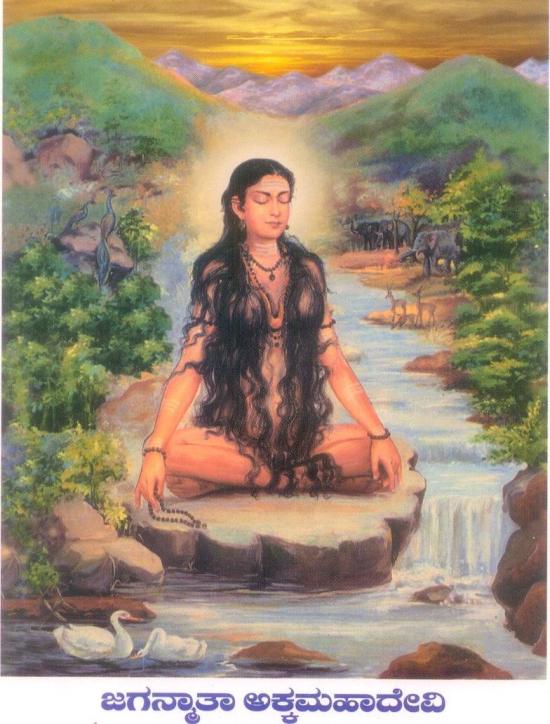“In childhood a female must be subject to her father, in youth to her husband, when her lord is dead to her sons; a woman must never be independent….If a wife obeys her husband, she will for that (reason alone) be exalted in heaven.” –Manu Smriti[1] ***
“I have nothing to do with the husbands of this world”- Akka Mahadevi
Akka Mahadevi in samadhi, nude but draped in her flowing hair. Image source.
I’ll try to reserve most of my comments for the end of this post. The following is a collection of verses by female, often low caste Bhakti (devotional) poets which I’ve collected from various books and journal articles. They challenge the way we normally think about women in Hinduism. Caste rules to gender norms, and even the Vedas and Brahmins all are opened up for fiery criticism. This is a part of the Hindu tradition, which often doesn’t get much press. You normally read about how caste is inherent to Hinduism, and how if one Brahminical texts says it, then it is the official, textually certified Hindu position on the matter. Not so. Hinduism is a much more anarchic tradition than that.
The Role of Women:
By Akka Mahadevi (12th century AD):
“The preceptor became the giver;
The Lord Linga became the bridegroom;
And I became the bride.
All this the world knows
The innumerable devotees are my parents
Hence Chenna Mallikarjuna is my husband,O Prabhu,
I have nothing to do with the husbands of this world” [2]
This is an inversion of Manu’s claim that a woman should treat the husband as God. She treats God as her husband.
“On a frame of water, raising a roof of fire,
Spreading the hailstones for the bridal floor-bed,
A husband without a head, married a wife without legs,
My parents gave me to an inseparable life,
They married me to Lord Chenna Mallikarjuna” [3]
Verses such as these can be read as conservative, but remember that this poet, like many others Bhakti sants, did refuse to get married to any man. This wasn’t just talk. Given the stigma attached to unmarried women in Indian society, this was a radical statement. In Akka Mahadevi’s case, she rejected a Jain king named Kausika rendering it an even more powerful act of defiance.
